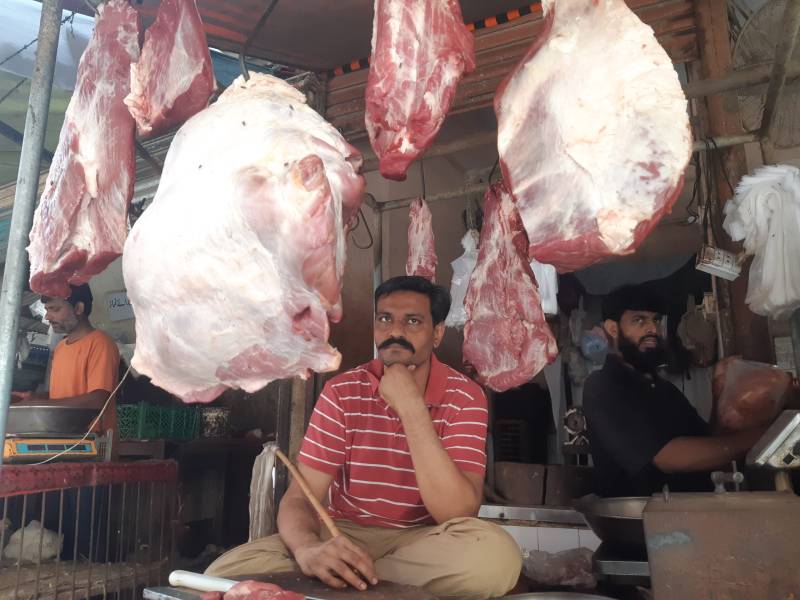
KARACHI, SINDH: After much hue and cry from farmers and delay Sindh has for the first time started vaccinating the livestock on Monday against lumpy skin disease (LSD) as imported vaccine arrived at the weekend. Meanwhile deadly viral disease continues to spread in the province, raising the affected animal number to over 32,000 since November last year.
“For importing the anti-LSD vaccine, we have an approval order of 3.3 million doses from the government. However, so far funds are available for 1.9 million doses which we have ordered to a Turkish company. So far 1.1 million vaccine doses have arrived. Rest of 800,000 doses are expected to arrive on coming Friday,” Dr Nazeer Hussain Kalhoro, director general (DG) Livestock Sindh told The Friday Times.
“For importing the anti-LSD vaccine, we have an approval order of 3.3 million doses from the government. However, so far funds are available for 1.9 million doses which we have ordered to a Turkish company. So far 1.1 million vaccine doses have arrived. Rest of 800,000 doses are expected to arrive on coming Friday,” Dr Nazeer Hussain Kalhoro, director general (DG) Livestock Sindh told The Friday Times.
According to Dr Kalhoro, vaccine doses have been distributed all over Sindh which will be delivered free of cost. Vaccination drive will start today (Monday).
Lumpy skin disease (LSD) is a viral disease of cattle that causes mortality and can result in animal welfare issues and significant production losses. The disease is spread primarily by biting insects such as certain species of flies, mosquitoes and possibly ticks.
Last month the provincial livestock department of Sindh declared the emergency and constituted a task force after the alarming increase in LSD cases since November last year.
In March Sindh Minister for Livestock and Fisheries Abdul Bari Khan Pitafi reportedly demanded Islamabad to allow it to import the anti-LSD vaccine, “but the permission was not timely granted.”
Livestock official data says LSD has spread all over the province where half of the cows are affected in provincial capital Karachi only.
“So far 32,981 animals affected in all over Sindh, 327 of them have died. However 17,975 animals have recovered,” DG Livestock Sindh told The Friday Times.
“In provincial capital Karachi only, 17,814 animals have been affected, out of them 43 have died while 5,726 were recovered,” the official informed.
Severity of LSD cases are coming from cows especially in exotic breeds in Karachi. It is not Karachi, only Lumpy Skin Disease has also spread to all other districts of the province with severe cases in Sanghar, Khairpur and Qambar Shahdadkot districts.
Meanwhile slaughterhouses say the government acted lately on arranging the LSD vaccine and it negatively affected their business.
“Since the start of the outbreak local selling of meat dropped in Karachi’s local market up to 75 percent. In addition it helped to improve meat exports to the Middle East up to ten percent,” Meat Merchant Welfare Association General Secretary Arsalan Shaikh told The Friday Times.
However, the situation has slightly improved in Karachi’s local market with the commencement of Ramadan and our loss has reduced to 60 percent now, Shaikh added.
On the other hand, the Dairy & Cattle Farmers Association that deals with milk producers says mortality loss was much higher than the government's statistics.
"Situation is worse. On average 200 animals are dying on a daily basis in Sindh,” Shakir Umar Gujjar, President at Dairy & Cattle Farmers Association told The Friday Times.
The loss of cattle mortality and perception about quality of milk has dropped sharply causing a huge negative impact on farmers,” Gujjar added.
He demanded that anti-mosquitoes be sprayed at all cattle markets of the country as mosquitoes and flies are the prime source of spreading LSD.
Mukhtyar Ali, a farmer from village Mewo Khan Rind near Nawabshah told The Friday Times that in the absence of government vaccines, private vaccines were available in the market which were expensive as well as inauthentic.
“Livestock is our major economy. Government should immediately vaccinate every affected animal so that this agriculture sector can be saved from devastation,” Ali added.
Text and photos by Zulfiqar Kunbhar

